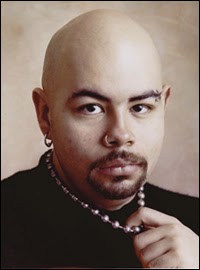 |
| Enrique Urueta |
Learn to Be Latina
is big, is bold, is hilarious, and it doesn’t apologize. The play follows a
young, talented woman named Hanan as she embarks on a strenuous journey of
re-identification in order to become the next big name in pop music. The
playwright behind this magnificent play is Enrique Urueta, whose play will be
the grand finale of Milagro’s 30th Anniversary season in May 2014.
Urueta, a native of the East Coast, was born and raised in Halifax County,
Virginia. He attended the College of William and Mary, where he began to learn
more about theater. In a recent
interview he described how he just “fell into it.” “As I went through college”,
Urueta said, “I became more academically interested in theater, not as an
artist, but as a historian.”
recalled attending a theater conference in Toronto and realizing that he had never
imagined that Canada might have its own theatre legacy. He soon made several trips there and back to
gather as much material as he could about Canadian theater history. During one
of his visits, he encountered a play by Canadian playwright Brad Fraser entitled,
Unidentified Human Remains and the True
Nature of Love, a comedy-drama about several sexually frustrated
“thirty-somethings” who try to learn the meaning of love during a
time in which a serial killer is
terrorizing their city.
reading this play, Urueta recalled that he “had never read a play that shifted
me emotionally.” The emotional shift he experienced reading Unidentified Human Remains…, also
caused his focus to shift from studying theater from a purely academic
perspective to a more artistic one.
completing his undergraduate studies, Urueta made his way to the West Coast:
San Francisco. It was there, in the Bay Area, that Urueta began his writing
career. “I took some writing classes in
college,” Urueta said. “But, I didn’t take it seriously until I moved to San
Francisco.”
February of 2005, Urueta wrote a short one-act play and entered it into a
festival. He had previously worked in a literary office, so he knew that
writing a comedic play would increase the chances of his work standing out. The
plan worked and it was very well received, so much so that his one-act was
produced.
In June of the same year, the Queer and Cultural Center in San Francisco did
a reading of another of Urueta’s plays, The
Danger of Bleeding Brown, about
a gay white man has his boundaries pushed by his relationship with a young gay
Latino, whose own internalized racism manifests in edgy sex play that tests the
limits of their relationship. From this experience they commissioned
him to write a full length play.
took the one-act play he had previously submitted to the festival and
transformed it into the first scene of Learn
to Be Latina. He conducted research about Latin celebrities who had roots
that extended beyond that of Mexico and Latin America, and found that two of
pop culture’s biggest Latina celebrities, Salma Hayek and Shakira, both have
grandparents of Lebanese origin.
found guidance in one of the protagonist’s opening speeches. “I wrote Hanan’s
monologue and saw the direction I wanted to go in,” Urueta said. “I like to
find a character and find a tone and write something that I want to see without
thinking about producers, actors, or anything. I write the play I want to see.”
Latina
made its stage debut in 2010 at the IMPACT Theater in Berkley, California. In
2011, it received the 1st Great Gay Play award from Pride Films and
Plays in Chicago. One of the judges said, “I would pay a large sum of money to
see this on stage.” Portland area audiences will have their opportunity when Milagro
presents its Pacific Northwest premiere this May, 2014. Urueta himself will be in Portland for the
opening weekend, to see his play and participate in a discussion following the
first Sunday matinee, sponsored by Oregon Humanities. He’ll also travel to Seattle to offer writing
workshops with eSe Teatro.
Get tickets for Learn to be Latina today and meet the playwright on Sunday, May 4th on the conversation series Learn to be Latina: Identity Bootcamp!
re-invented. She changes her name, learns a little Spanish and whole new
cultural framework from which to talk about herself, raising questions about
the mutability of identity. Visiting
playwright Enrique Urueta will lead the conversation with guest scholars about
his inspiration for this work, how artists reflect identity in their works, and
how true life provides examples of transformed identities. In art as in life,
how is identity accepted, ascribed or re-created? How does it impact how we are treated or
treat others?
